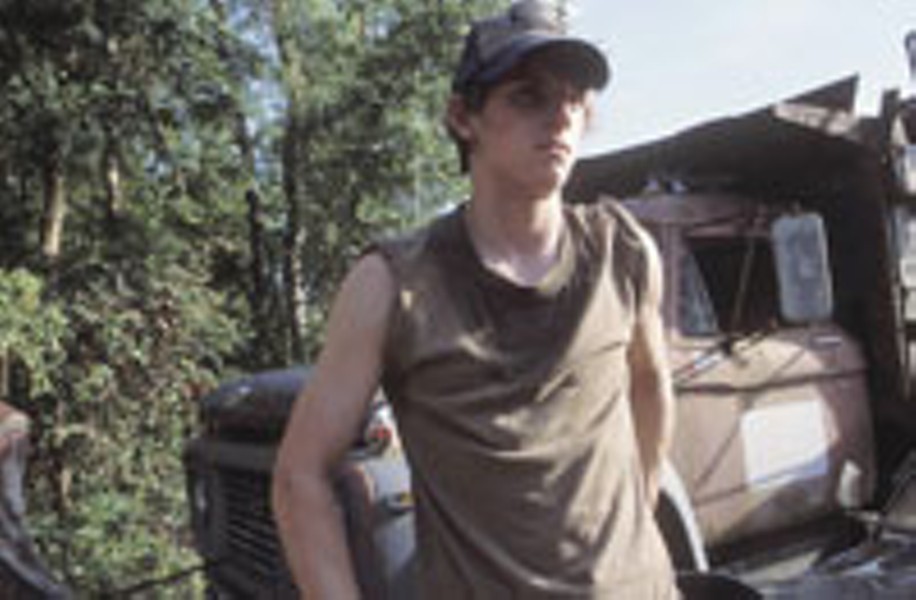In the Peony Pavilion, a sumptuous entertainment house (read: brothel)
Probably the most gratifying compliment you could pay an actor would be that he disappeared so completely into a role that you forgot who you were watching. That's what I would tell England's Jamie Bell (the titular Billy Elliot) after witnessing his flawless turn as a semi-delinquent Georgia teenager in David Gordon Green's Southern gothic coming-of-age tale/road movie/suspense film Undertow (Friday, January 28, 8 p.m., Dryden Theatre, 271-4090).
Strangely, however, the highest praise you could give a director might be to say that when you saw his film you knew exactly who you were watching. That's what I would tell Green... and I just might because he'll be at the Dryden to introduce the screening of Undertow and answer questions like, "How many times have you seen Days of Heaven?"
Undertow is the 29-year-old Green's third film --- first came the festival darling George Washington, followed by the slightly overpraised All the Real Girls. Both of those films were set in a ramshackle South populated by the real and the really eccentric; both featured dialogue that made you feel like you were eavesdropping; and both were shot by insanely talented cinematographer Tim Orr.
Undertow also enjoys those qualities, though Undertow utilizes a more traditional story structure than was found in Green's two previous films.
Bell plays Chris, who we meet as he's impaling his bare foot on a nail while trying to outrun his girlfriend's dad. Chris is big brother to Tim (Devon Alan), a sweet yet disturbed 10-year-old suffering from a compulsion to eat the inedible (i.e. paint, dirt). Both are sons to farmer John Munn (Dermot Mulroney), a reticent widower who causes his family to lead a sheltered, lonely existence and only seems to notice his children when they're in trouble.
In swaggers John's brother Deel (a chilling Josh Lucas), an ex-con whose laidback demeanor temporarily masks the greed that brought him to the Munns' doorstep. Hidden somewhere on the farm are rare gold coins that once belonged to Deel and John's father. Deel feels entitled to them and, in a tragic scene, gets them. Through a series of mishaps --- and only in the movies --- Chris and Tim actually wind up with the coins and they take off, with Deel in pursuit.
It's a coming-of-age tale because Chris is forced to abandon his selfish ways and take care of his helpless little brother. It's a road movie because in their travels Chris and Tim meet up with a variety of colorful characters, such as the makeshift family of teenagers and the impoverished yet generous couple who think they're helping the boys. And it's a suspense film because we're white-knuckling it the closer Deel gets to Chris and Tim.
I referenced Days of Heaven since filmmaker Terrence Malick is obviously a big influence on Green --- the slice-of-life script, the sun-soaked images, the literary allusions. And Malick must be a fan of Green's in return, as he's one of the producers here. Throw in an interesting score by Philip Glass that occasionally borders on cacophony (that's actually not an insult --- it works), and with Undertow, David Gordon Green leaves no doubt that he's one of the most interesting artists making movies today.
"What the old janitor did in this room, no one knew."
We sure as hell know now. When Henry Darger died in 1973, the reclusive caretaker left behind a handful of acquaintances and three photos of himself. Also discovered in his tiny Chicago apartment were 300 double-sided paintings and 30,000 written pages, 15,000 of those pages making up a massive illustrated novel called In the Realms of the Unreal. All of this art was by Darger himself.
What did you do after work yesterday?
In the Realms of the Unreal (Thursday, January 27, 8 p.m., Dryden Theatre, 271-4090) is also the title of Oscar-winning documentary filmmaker Jessica Yu's intriguing look at Darger's prolific fantasy world and how it possibly could have sprung from his mundane everyday life. Darger's unhappy childhood found him in an orphanage, followed by a "home for feeble-minded children."
He started working as a janitor at a young age and eked out a meager living until his retirement. He faithfully attended Mass and corresponded with his one friend. The few people who met him relate the impressions gleaned from their brief encounters with this unassuming and devout man.
On his own time, though, he crafted the epic tale of the Vivian sisters, seven little girls who do battle with evil armies of adults intent on enslaving them. For the illustrations, the untrained artist would clip images of children and trace them into the situations he envisioned for them, be they scenes of idyllic play or violent carnage.
The decision to animate Darger's paintings for the film must have been a tricky one, but it's done in a respectful way, bringing movement and sound to previously still graphics. I kept wondering if Darger would have minded, but it was probably how it looked and sounded in his head as he wove the story.
There is admittedly something disturbing about a grown man's fascination with little girls. In these times it's easy to jump to the obvious conclusion. The film, however, only speculates about any possible undiagnosed mental illness and makes no judgments. Neither should the viewer. It's about a creative, troubled person wrestling with his demons the only way he could. As far as I know, that's how art is made.
